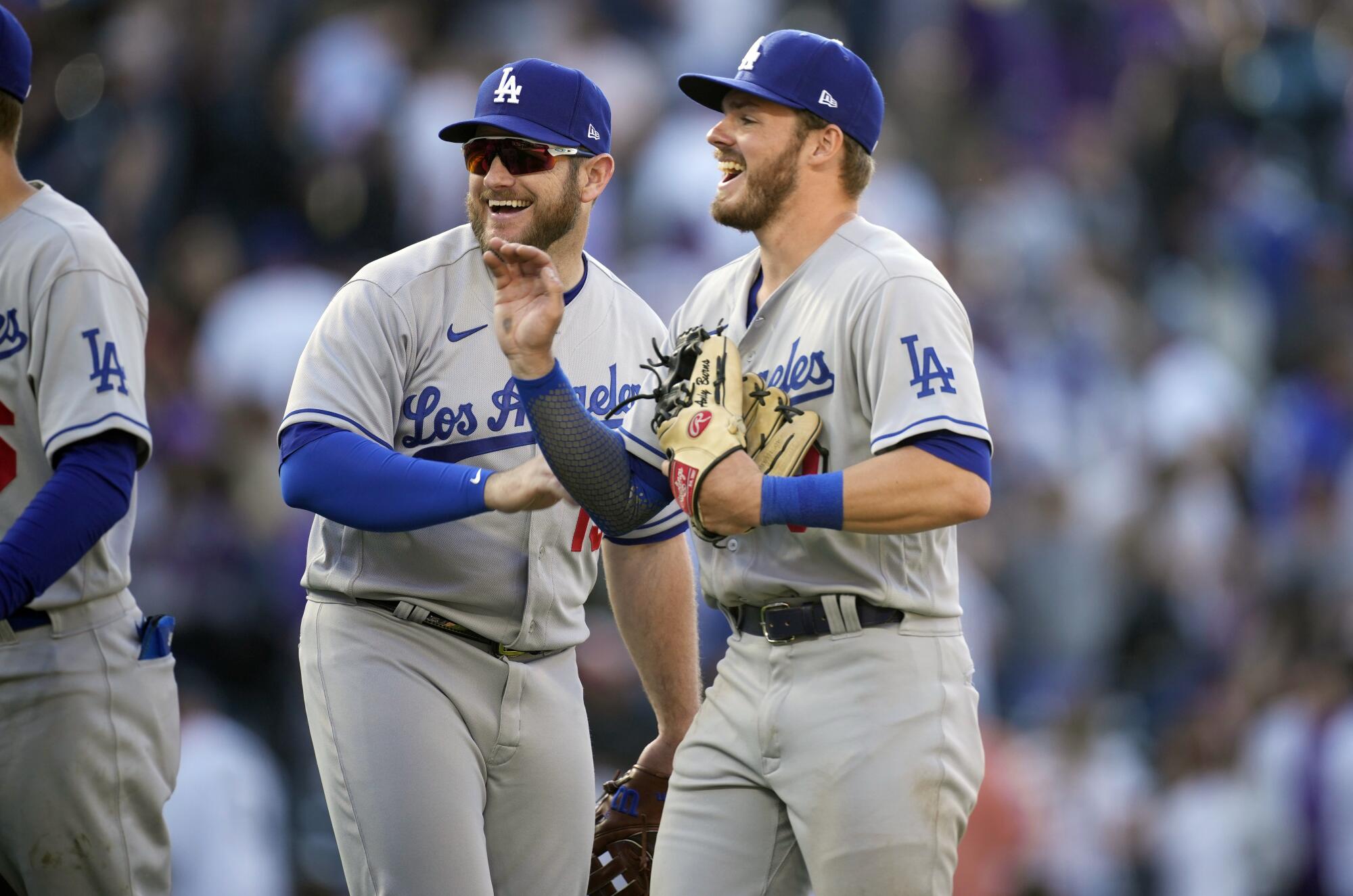
- Share via
Gavin Lux kicked his feet up on the railing of the visitors’ dugout at San Diego’s Petco Park this past weekend and leaned back, looking across a quiet pregame scene.
The Dodgers infielder was comfortable in his surroundings the way he has been for most of this season, increasingly encouraged again in his brimming future.
But in this moment, Lux was also more reserved, reflective, trying to reconcile a roller-coaster start to his big league career.
“The last few years for me, it was hard mentally,” he said, an exasperated strain in his voice. “I was struggling.”
For now, those days appear behind him.
Since the start of the season, Lux has been one of the Dodgers’ more productive players. Entering Wednesday’s afternoon game at Arizona, he had a .262 batting average and a .777 on-base-plus-slugging percentage. He’s been playing solid defense at second base and in left field, a utility role that has kept him in the lineup almost every day. Just about everyone who has watched him the past couple of years has come to the same conclusion.
He is confident again. And it’s becoming evident in his game.
“Whatever he’s doing, he can sustain it,” manager Dave Roberts said. “The results are always so up and down. But this year more than ever, I’ve seen his mindset be much more consistent.”
Paired with Joe Davis, Jessica Mendoza is both entertaining and informative while working select road games on the Dodgers TV broadcasts.
Echoed the organization’s triple-A manager, Travis Barbary: “There are going to be bumps in the road. But I think the things that he’s been through the last couple of years have prepared him to deal with those.”
Even back in Lux’s hometown of Kenosha, Wis., his uncle Augie Schmidt IV, a former second overall MLB draft pick and current head coach of Division III Carthage College, has seen the evolution.
“I think he’s found his place,” Schmidt said.
Almost every player’s game can come and go depending on their self-belief. But it has seemed especially true with Lux, a former 20th overall draft pick, consensus top-five prospect in baseball and, the Dodgers hope, someone who at 24 years old is reaffirming his status as an integral part of the club’s future.
“I don’t even think it was physical,” Lux said of his early-season success. “I feel like I always knew I could do it physically. But mentally, there were blocks that I had to fight through, to get through.”
From his dugout seat, Lux kept his gaze trained on the field, staring out at the manicured diamond, the oversized videoboards, the 42,000 empty seats — and all the expectations that accompany the setting.
“Feeling like you belong, knowing you belong,” he said, “that was the biggest thing for me.”
::
Over his time as manager of the Dodgers’ affiliate in Oklahoma City, Barbary has developed a routine for players who get demoted from the majors.
“Nobody wants to get sent down,” he said. “So you give them a couple of days to get back to, I’m in triple-A mode. I’m not in the big leagues.”
“But at some point,” Barbary continued, “you‘ve got to challenge them to get back to what they were doing. What got them into the big leagues in the first place.”

That’s what played out with Lux last fall, after the infielder was optioned to triple A in late August amid an inconsistent, underwhelming and injury-hampered first full major league season.
“The emphasis was just on competing,” Barbary said. “Every pitch in the batter’s box. Every pitch on defense. And just trusting that your talent is going to be there.”
Barbary never foresaw Lux being in such a situation. Three years earlier, Lux completed his meteoric rise through the Dodgers’ system with a stunning 49-game display in Oklahoma City.
He batted close to .400 with 13 home runs and 35 extra-base hits. He reached base safely in his first 37 games.
“I thought, ‘This is the best player that’s come through our system, position player-wise, in a long time,’” said Barbary, now in his 28th season in the Dodgers’ organization. “The things he was doing every day were incredible.”
Lux’s time in with the triple A-affiliate coincided with that season’s trade deadline. His name swirled in rumors as the Dodgers explored help for their bullpen. But the club ultimately held on to him, calling him up for his MLB debut that September.
“Obviously, it’s not fair to think he’s going to continue to do that when it goes to the big leagues,” Barbary said. “But everything was just clicking that year for him. And so, maybe unfairly, that was the expectation.”
Quietly, Lux amplified the pressure on himself.
“When I first got here, I was like, ‘I‘ve got to hit .340 with 30 home runs,’” he said. “It’s just not realistic.”
Instead, Lux’s rapid ascent hit turbulence.
If the Dodgers are to build a legacy and even start a conversation about a potential dynasty, they need to win more than just division titles.
He batted just .240 in 23 games with the Dodgers to end 2019. He failed to lock down an everyday role at second base at the start of the pandemic-shortened 2020 campaign after reporting late to camp following a bout with COVID-19.
After that, he never looked right. He struggled while playing only 19 games in 2020, hitting just .175 and spending much of the season at the club’s alternate training site. He was thrust into more playing time last year, filling in at shortstop after Corey Seager broke his hand, but slumped to a .227 average before suffering a hamstring strain in July.
He returned a month later, but went hitless in three games before being sent down to triple A. His once sky-high stock had plummeted. His confidence had bottomed out too.
“I probably lied a bunch saying there’s no pressure, but yeah, I think I felt it,” he said. “And you can’t play baseball like that.”
Back in Oklahoma City, Barbary gave Lux his grace period. But after a couple days, he sat with Lux on the floor of a hallway outside the team’s batting cage, trying to lift the player’s spirits and present him with a challenge.
“Look, all I need you to do is compete,” Barbary told him. “Forget about the other stuff. Just compete and grind out every at-bat. And you’re going to figure it out.”
::
Since the start of Lux’s pro career, Schmidt always leaves his nephew with an annual reminder before he heads out to spring training.
“I kick him in the tail and I say, ‘Go fail,’” Schmidt said by phone recently. “He laughs, because he knows exactly what I’m talking about. It’s what I’ve been talking to him about since he was little. You’re going to fail more than you’re going to succeed. What sport is like that?”
Lux had experienced failure before his MLB debut. His numbers in single A in 2017, his first full minor league season, were underwhelming. He struggled with the yips on throws at times too.
But nothing could prepare him for the spotlight of the majors — one that felt particularly intense playing for the Dodgers.
“I fought some anxiety and stuff, where it’s just like, I had to just get comfortable in my own shoes,” Lux said.
Added Schmidt: “He was trying to do too much. He was trying to prove he belongs, trying to stay in the lineup.”
In his first extended MLB opportunity last year, Lux started swinging (and chasing) more than usual. When he made contact, he wasn’t driving the ball the way he did in the minors. And though he went through a couple of hot stretches, he never felt right at the plate.
“After every game, it was like a mental battle with myself, trying to not think about my at-bats every day,” Lux said. “I did. And it kills you.”
Then came the minor league demotion in August, sending Lux back to Oklahoma City on a non-rehabilitation assignment for the first time since his initial MLB call-up.
“It was just kind of like, ‘S—, man,’” he said.
Once he was back in the minors, however, Lux found some clarity. At the nadir of his professional career, he changed his perspective, heeding the advice of his family and his coaches.

He finally let the pressure go. And improved results followed almost immediately.
“There came a point in time where he was just like, ‘All right. Enough’s enough. Let’s figure this out,’” Barbary said. “It was almost like you could see a light switch go off.”
It helped that Lux wasn’t stuck in triple A for long, getting called back up in early September amid a rash of injuries on the Dodgers’ roster. He also had to learn a new position on the fly, moving to the outfield for the first time in his life.
“I’ve worked with him since he was 7 years old,” Schmidt said with a laugh, “and I’d never hit him a fly ball.”
Against the backdrop of the Dodgers’ tight division race with the San Francisco Giants, it made every trip to the plate too important for Lux to get caught up in his overall numbers, or the long-term trajectory of his career.
“Instead of me pressing on myself, saying, ‘You’re one of the top prospects in baseball, and you’re not performing how everyone wants you to,’ I just kind of said, screw it, let’s just focus on trying to help win,” he said. “I think that kind of freed me up mentally, where it wasn’t all on me.”
In his final 17 games last season, Lux hit .360 with more walks than strikeouts. He appeared in all but three of the team’s playoff games. And when he returned home in the offseason, his new mindset had sunk in.
“When he came home for the winter, he was a different person,” Schmidt said. “It was a different Gavin.”
::
So far this season, that approach hasn’t changed.
Lux’s improved numbers still stop short of spectacular, with only one home run and five RBIs so far. But he knows that his at-bats have been high-quality (an assessment with which Roberts concurs), his underlying numbers are strong (he has some of the highest expected stats in the majors, according to Baseball Savant) and his game is still trending in the right direction.
“Last year, I would have been pressing so hard, like, ‘I’m not getting results,’” Lux said. “Right now, I think it’s just more about the process. ... I’m taking that mindset of just having great at-bats and the rest will take care of itself.”
His upbeat personality has been ever-present, his dugout antics already creating a couple of memorable moments that have become fan favorites on social media — including a clip of him hyping up Freddie Freeman last week, and wrapping Cody Bellinger in a humorously long hug this past weekend.
His behind-the-scenes work ethic and demeanor has impressed the coaching staff too.
Pitcher Walker Buehler threw a complete game and first career shutout in the Dodgers’ 4-0 win over the Arizona Diamondbacks on Monday in Phoenix.
“The questions he asks now are very intelligent questions,” Roberts said. “He’s not just chasing hits and chasing results. [He’s] staying in the moment … and not worrying about the unexpected, what hasn’t happened yet, future or past results.”
He even enjoys his role as the club’s No. 9 hitter, where he gets to set the table for top-of-the-order superstars Mookie Betts, Freeman and Trea Turner.
“You could argue that those are the three best players in baseball,” he said. “ And I get to learn from those guys every day.”
There’s still hope that Lux can one day approach that level, too, that his consistent finish to last season and bright beginning to this season are the start of a new chapter — one that could be defined not by unmet expectations, but confident overachievement at the level where he now comfortably resides.
“I feel like if anybody can handle the ups and downs that he’s been through over the last couple of years, it’s Gavin,” Barbary said. “He’s a tough kid. Extremely talented. And I think he’s starting to settle in and show what he can actually do.”
More to Read
Are you a true-blue fan?
Get our Dodgers Dugout newsletter for insights, news and much more.
You may occasionally receive promotional content from the Los Angeles Times.














